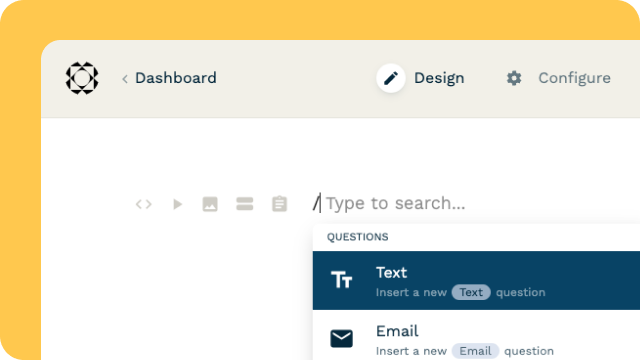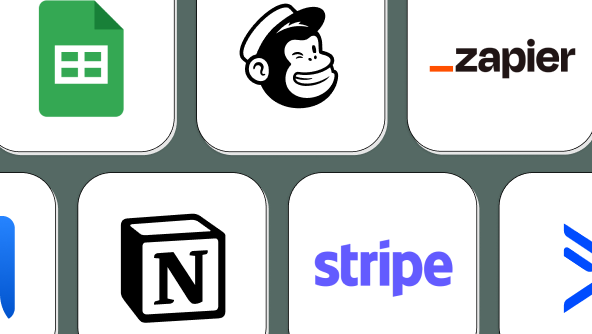
All Solutions

Explore all the solutions you can create with Paperform: surveys, quizzes, tests, payment forms, scheduling forms, and a whole lot more.
See all solutions











Connect with over 2,000 popular apps and software to improve productivity and automate workflows
See all integrationsProducts
Solutions
All Solutions

Explore all the solutions you can create with Paperform: surveys, quizzes, tests, payment forms, scheduling forms, and a whole lot more.
See all solutionsIntegrations

Connect with over 2,000 popular apps and software to improve productivity and automate workflows
See all integrationsResources
Exit interview questions: 15 questions managers actually use

It's the news you never want to hear: an employee is leaving your company.
That announcement inevitably kick starts an avalanche of things you need to take care of. Notifying the team. Completing stacks of paperwork. Starting your search for their replacement.
But as you work through all of those loose ends, there's one more important thing to add to your list: conducting an exit interview.
What is an exit interview?
An exit interview is a meeting between a departing employee and someone in a leadership position within your company.
Usually it'll be covered by the HR team, but sometimes the business owner or another manager depending on the size of your organisation.
These conversations can happen in-person, via phone or video chat, through a survey, or any combination of those.
Regardless of the format, the goal of any exit interview is to collect as much feedback as possible.
You want to hear all of the nitty gritty details about that employee's experience working for you before they're officially off the payroll.
Why are exit interviews important?
Constructive criticism always stings a little bit—and that's especially true when it's coming from an employee who decided they want to hit the road.
Even so, it's important to summon your courage and conduct an exit interview anyway. Here's why:
1. Exit interviews collect honest and valuable feedback
Even if you frequently do employee surveys, host one-on-one meetings, and plan other frequent opportunities to hear employees' insights, you probably aren't quite getting the cold, hard truth.
The reality is that people are usually more likely to be honest and forthcoming when they have less on the line.
An exiting employee no longer counts on you for a paycheque, promotions, or other positive recognition, so they're more willing to share their most candid feedback.
Chances are, some little-known facts will bubble to the surface and you'll get a much deeper understanding of what it's actually like to work for your company.
2. Exit interviews emphasise a culture of listening
It's no secret that a lot of people feel undervalued and even completely unheard at work.
In fact, in one recent survey conducted by the Workforce Institute, a whopping 83% of employees in the UK said that people in their organisation are not heard fairly or equally.
An exit interview demonstrates that you really are hungry for your employees' feedback—even if they're moving on shortly.
It shows that employee (and all of the ones who are still with you) that you'll continue to value their opinions and experiences, regardless of the circumstances.
3. Exit interviews help your company improve and evolve
Exit interviews are focused on collecting feedback—but it's what you do with that feedback that matters even more.
When an exiting employee shares opinions about what they would change, take the next steps to dig into their suggestion and see how you can apply that moving forward.
It could make all the difference in retaining your current employees, as well as any new ones that come on board.
5 tips for conducting a valuable exit interview
When it comes to getting as many nuggets of wisdom as you can out of these conversations, the exit interview questions you ask will carry a lot of weight (and we'll get into those in detail in a bit).
But there are a few other things you'll want to keep in mind to ensure your exit interview is packed with value (rather than doubt and nerves).
1. Give advanced warning
This isn't an impromptu meeting or something that you can spring on employees at the last minute.
They need adequate time to reflect on their experiences and show up to that conversation prepared, so put the exit interview on their calendar ahead of time (at least a few days, but even more is preferred).
Also, be aware that employees aren't under any obligation to participate in an exit interview. They're well within their right to decline that meeting.
If they do, take that as an indicator that there are some cultural issues you should investigate, particularly with regard to employees feeling empowered and supported to speak up.
2. Use a survey
Many people opt to conduct exit interviews with one-on-one conversations, but using a survey offers a couple of advantages, including:
- People might be more willing to share feedback in writing and raise concerns they wouldn't feel comfortable sharing directly
- You have the ability to use different types of questions (like rating questions) that make it easier to compile answers and make data-driven decisions
A survey doesn't have to be all or nothing, either. You could send an exiting employee a survey ahead of time and then use a personal conversation to dig deeper into some of their specific answers and feedback.
customer feedback survey
3. Find a neutral party
Some of the exit interview questions you ask will focus on management style, and that feedback can be especially awkward for an employee to share with their own boss.
That's why exit interviews are usually best conducted by a more neutral third party—such as your HR department or a different manager from within the company.
4. Be mindful of response bias
Response bias is an umbrella term for various factors that lead people to respond to survey questions in an untruthful or misleading way. They aren't necessarily doing so maliciously, but because they perceive it's in their best interest for whatever reason.
Response bias can be tough to completely eliminate, but carefully structuring your exit interview questions can help. Here are a few tips:
- Ask open-ended questions: Open-ended questions are ones that require a longer answer, rather than a simple "yes" or "no." Some of your exit interview questions will undoubtedly require a short response, but you can follow that up by asking employees to expand with something simple like, "Why?" or "How?"
- Avoid leading questions: Leading questions are questions that subtly guide people toward a desired response. You might think they're easy enough to avoid, but they can easily creep in. For example, you're better off asking an employee something like, "How did you feel about the management style?" than, "Did you think the management style was supportive or unsupportive?" That second option leads employees toward only one of two options.
- Mix up your question formats: Particularly if you're using a survey, you have tons of flexibility to use fresh question formats. From multiple choice to long answers to asking them to rate their agreement with certain statements, that variety will keep your exit interview interesting and require employees to think carefully about every single question.
- Ask for examples: Asking employees to share tangible examples along with their responses forces them to go beyond hypotheticals. They need to work through the reality of their actual experience, which can help them think critically and avoid answering questions a certain way because it "sounds right."
5. Practice active listening
You'll get a ton of information during an exit interview and it's your job to listen, absorb, comprehend, and retain what's being shared.
Active listening can help. Make a conscious effort to fully take in everything an employee is telling you and confirm your understanding by summarising their responses back to them.
That will make an employee feel even more supported, while also enabling you to walk out of that conversation with as much valuable insight as possible.
Form a better life now.
15 example exit interview questions experts actually use
Now for the thing you want to know most: what questions should you ask in an exit interview?
We connected with various business leaders to get the lowdown on what exit interview questions are always on their list. Here are 15 that you have full permission to steal from them.
1. What made you look for a new job?
The best way to start the conversation is to ask the employee what factors contributed to their decision to look for a new opportunity.
"Knowing what exactly flipped the switch for the leaving employee can help us prevent turnover with our remaining team members," explains Paul Kushner, Mixologist and CEO of MyBartender.com.
"Sometimes it's something from outside of work, like financial obligations or moving to the other side of town. But when it is because of us, it is important to know early signs of disengagement."
2. What could we have done to keep you with us?
Once you know what made them want to leave, find out if there's anything you could've done to make them want to stick around.
"If your employee may have been swayed to stay, you need to know how," says Ruben Gamez, CEO and Founder of SignWell.
"The working relationship might still be salvageable and you can learn valuable lessons to help you retain other teammates in the future."
3. Were you satisfied with the way you were managed? Why or why not?
You've probably heard the cliché that people don't leave jobs—they leave managers. Plenty of data backs that up, with 82% of people admitting that they'd consider quitting their job because of a bad manager.
That's why it's imperative that you ask about management style in your exit interviews. You might discover that there's an issue with your overall approach or even a specific leader that you need to address.
4. Did you have adequate support in your role?
It can be disheartening and discouraging for employees to repeatedly feel like they don't have the access and resources they need to do their jobs well.
This question helps you determine if they had what they needed to succeed in their position.
"The workplace has transformed multiple times over the last few years, so you want to be sure the way you've set up everything—from management check-ins and support to your software stack—is working for your team," explains Jack Underwood, CEO and Co-Founder of Circuit.
5. Did your position match your job description?
Employees had certain expectations when they joined your organisation and this question digs into whether or not reality matched those assumptions.
You're not in the business of catfishing jobseekers. So, you can use the information in their responses to tweak your job descriptions or tailor the actual job responsibilities so that new applicants have a better idea of what they're responsible for.
6. What skills should we look for in your replacement?
Nobody has more insight into what a job is like day in and day out than somebody who's worked it before.
This question gives the employee an opportunity to call attention to the qualifications they think are most important in their role.
Again, it will help you write more realistic job descriptions while also giving you criteria to use as you evaluate new candidates.
7. Did you have clear goals, objectives, and tasks?
When over half of employees admit that they don't actually know what's expected of them at work, this question gets to the heart of something important: the clarity of your communication.
If you find out that the employee felt like they were aimlessly wandering without any sort of helpful direction, you know you need to overhaul how responsibilities get delegated to your team members.
8. Did you have access to learning and development opportunities?
Whether an employee pointed to advancement as their reason for leaving or not, most people are still hungry for growth opportunities.
If employees don't feel like they have the resources or support to develop their careers, it's easy for them to feel like the only way up is out.
This question can uncover ways that you could level-up your training, development, and education offerings.
And, when only 39% of employees say their current employer helps them improve their current skills or gain new skills, your learning culture is sure to be a competitive advantage.
9. How would you describe our work environment to someone considering working here?
This is a question that Grace He, People and Culture Director at Teambuilding.com, always makes sure to ask in exit interviews. It gives you a peek inside an employee's brain to understand how they really perceive your company.
You can keep this question completely open-ended or even challenge employees to choose a limited number (like three or five) adjectives to describe your workplace and team culture.
10. What career goals have you achieved in the company?
Exit interviews might feel like they have a dark cloud of employee turnover hanging over them, but they don't need to be all doom and gloom.
Kevin Huang, Founder and CEO of Ambient Home, likes to ask a question like this one in exit interviews. You can understand what employee ambitions you were able to support and even how you did so (which is something you can repeat and reinforce moving forward).
11. What are you most proud of from your time here?
Similarly to the above, ask employees to share some accomplishments that they're particularly proud of.
This gives you a chance to celebrate the contributions they made to your organisation and helps you wrap up the interview (and your working relationship) on a positive note.
12. If you could change one thing about your job or this company, what would you change? Why?
This question can be a challenging one for employees to answer, but it really gets to the core of what they really struggled with while working for you.
Whether they mention a micromanaging leader, an outdated and frustrating process, or relentless office gossip, you'll be able to shine a spotlight directly on the most pressing issue that needs immediate fixing.
13. Were you adequately paid in your position?
Talking about money makes everybody cringe. But, when low pay is the top reason that people leave jobs, you need to ask a question like this one to see if you're paying wages that are competitive with the market.
If not? You need to revisit your pay structure to see how you can more fairly compensate current and new employees—otherwise you'll risk losing more and more talent.
14. Would you recommend this as a place to work to a friend or family member? Why or why not?
As another question suggested by Grace He, this one is almost like a Yelp review of your business—but from an employee's perspective.
If they wouldn't suggest your company to a friend, press them for their reasoning. That will call attention to areas of improvement.
15. Would you ever consider working with us again?
And finally, it's worth asking the employee if they could ever see themselves coming back in the future.
"This encourages conversation around improvements at our own office, and what sort of career goals they can envision pursuing (or not) with our company," says Gates Little, CEO of altLine at the Southern Bank Company.
"This question opens up the possibility of keeping in touch for future opportunities, and also reassures exiting staff that there are no hard feelings."
Make these conversations easier with an exit interview template
You're equipped with everything you need to know—strategies, questions, and more—to host an exit interview that gets you the most valuable insights.
Think it sounds like a lot of work? Well, it can be. Fortunately, you don't need to start from scratch every single time. In fact, starting from an exit interview template helps you standardize the process and avoid being swayed by biases of your own.
Ready to summon your courage and gather wisdom from your employees before they slice into their "goodbye" cake or have their final Zoom send off? Grab this exit interview template below to collect their insights in a way that's organized, positive, and (mostly) painless.
exit interview form
Form a better life now.
Get your 7 day unrestricted trialChoosing an automation tool as a small business shouldn’t feel overwhelming — but it often does. Wit...
Explore the top 15 DocuSign alternatives of 2026 for secure, easy-to-use eSignature solutions. Find ...
This article will help you untangle the web of very “samey” WordPress form builder plugins.
Trying to decide between Zapier and Stepper? This in-depth comparison breaks down pricing models, wo...